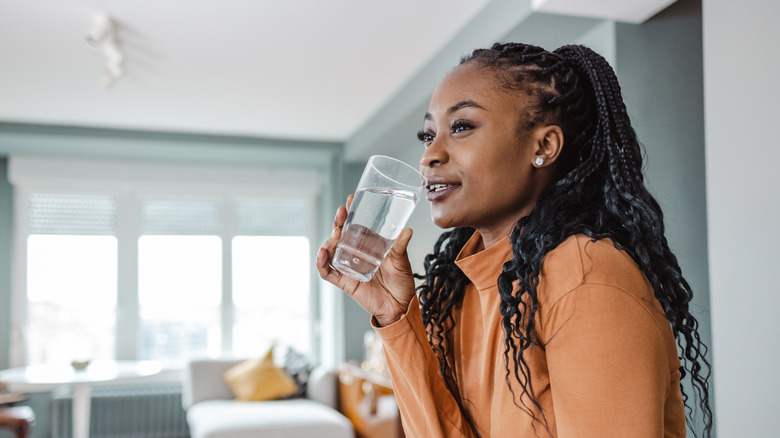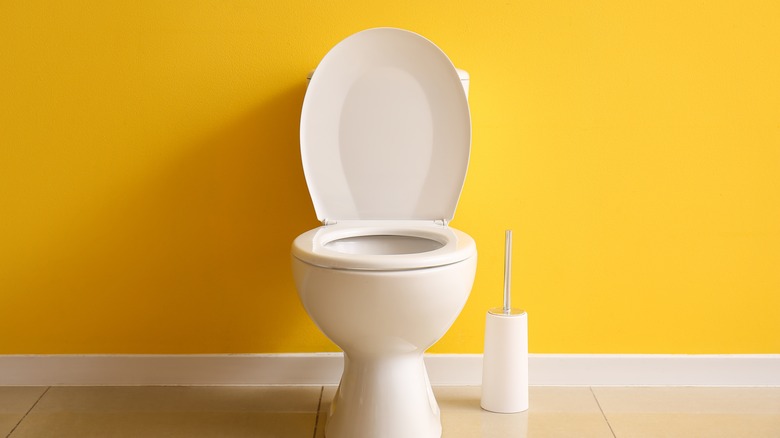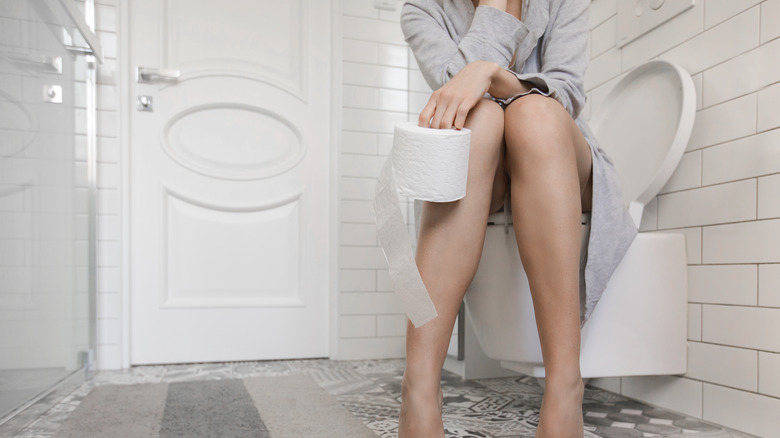What It Means When You Pee Right After Drinking Water
When experts, well-meaning family members, and even your neighbor are touting the benefits of drinking enough water during the day, you're probably on the bandwagon to better hydration.
But what happens when you drink water and immediately have to go to the bathroom? It's not only inconvenient but it might also be embarrassing in certain situations (for example, if you're at a job interview, and you are just about to be called in). This can happen because of a number of different reasons. It could mean that you're drinking too much water, that you have an overactive bladder, that it's cold outside (this is why you have to pee more during the winter), or that you have a small bladder (and yes, that's a thing). It could also mean that you have a urinary tract infection, diabetes, kidney stones, or something called "urge incontinence." Stress or anxiety-induced peeing can also be to blame.
Whatever the reason, wanting to pee right after drinking a glass of water is not pleasant, especially if you don't have a toilet nearby. You may want to start by figuring out whether you're over-hydrating. As explained by David Nieman, a professor of public health at Appalachian State University and director of the Human Performance Lab at the North Carolina Research Campus (via TIME), "If you're drinking water and then, within two hours, your urine output is really high and [your urine] is clear, that means the water is not staying in well."
Your urine color will tell you if you're drinking too much
There are surprising things your pee can reveal about your health. One aspect of this is the color of your urine. WebMD recommends adopting the Goldilocks method when drinking water. Check your output and see if it's clear or pale yellow, but don't spend all day on the toilet. A darker hue accompanied by stronger-smelling pee might mean you're drinking too little, and overly clear pee might mean you're over-hydrating.
Board-certified nephrologist, Dr. Joshua Thurman told HidrateSpark, "The body is ordinarily very good at maintaining the proper balance of water. The amount of water that you put out in urine will generally match what you take in. That means that if you do not take in much water, the kidneys will concentrate the urine and minimize the amount of water lost in the urine. If you drink a lot of water the kidneys will dilute the urine so that the body can get rid of the water that it does not need."
Even so, there is such a thing as too much water, especially if you're running to the bathroom throughout the day. When you drink a glass of water, it absorbs into your system a lot sooner than food does — more specifically in about just five minutes (per Healthline). By a general rule of thumb, peeing anywhere between 6-7 times within a 24-hour window is considered normal. If you feel like your urge to pee is disrupting your everyday life, then it might be time to see a specialist.
When peeing right after drinking water becomes a problem
With health conditions like kidney stones, diabetes, and urinary tract infections, there will be other symptoms that present themselves. For example, kidney stones usually involve pain in your belly and groin area, nausea, vomiting, fever, and chills, according to Penn Medicine. Fatigue, weight loss, trouble with vision, and slow-healing wounds are all signs of diabetes (per Mayo Clinic). Urinary tract infections could result in pain during urination, sudden urges to pee, and cloudy urine, explains NHS Inform. See your healthcare provider if you think one of these might be the cause for wanting to pee right after drinking water.
For those people with small bladders, simply training yourself to hold more urine in over time can do the trick, shared the program director of the Division of Kidney, Urologic, and Hematologic Diseases at the National Institute of Diabetes and Digestive and Kidney Diseases, Dr. Tamara Bavendam (via Prevention). Increase your bladder's capacity by holding in your pee (as long as it doesn't hurt), and stretching it. "If you give into the urges too often, you are training the bladder not to hold as much," explained Dr. Bavendam.
As for conditions like an overactive bladder (OAB) or urge incontinence, you would have to take a more nuanced approach. OAB results in a sudden and uncontrollable urge to pee. Urge incontinence can be frustrating because it can also cause urine leakage and bed-wetting. Your doctor will perform a pelvic exam, bladder scan, and urodynamic testing before giving you a treatment plan, which often involves medication and lifestyle changes, says Medical News Today.



